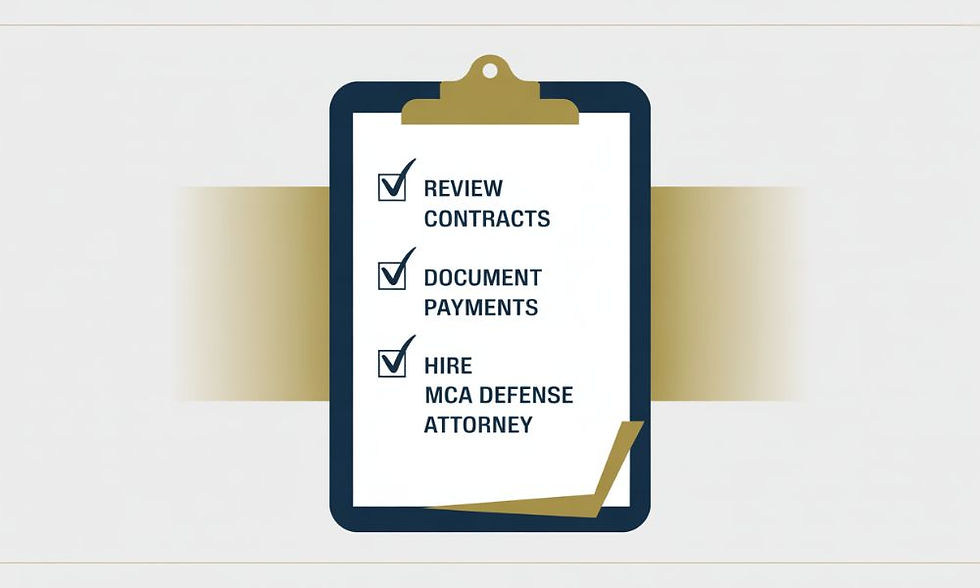What Makes an MCA Legally Unenforceable? A Guide to Lender Misconduct
- Craig Lebowitz

- Sep 23, 2025
- 5 min read
Updated: Sep 29, 2025

A merchant cash advance (MCA) feels quick and easy. A lender wires money within days and calls it a “purchase of future sales,” not a loan. Then come daily withdrawals that never seem to end. Many owners learn too late that the cost rivals triple-digit interest.
When income dips, payments keep coming, and the squeeze is on. This guide explains when an MCA crosses the legal line, what happens after a default, and how Business Debt Counsel can help you fight back.
How an MCA works, and why it traps firms

An MCA is not scheduled like a term loan. Instead, the contract sets:
Advance amount – the cash you receive today.
Factor rate – often 1.3 to 1.5. Multiply that by the advance to see what you must repay.
Daily or weekly ACH pulls – fixed in dollars or a percent of card sales.
Example: You take a $100,000 advance at a 1.4 factor. You owe $140,000. If the agreement pulls $1,400 a day, you will finish in 100 business days—unless sales slump. In a slow week, you may get hit twice as hard because the pulls stay flat while revenue falls. That mismatch causes cash-flow shocks, late payroll, and a cycle of stacking new MCAs on old MCA debt.
This fixed repayment structure is why many owners fall into stacked MCA debt, a problem explored in our guide on Merchant Cash Advance Pitfalls.
Lender misconduct that voids an MCA

Some lenders cross lines that courts will not ignore.
Misconduct | Why it matters |
Confessions of judgment (COJs) | A COJ lets the lender enter judgment without a trial. Several states ban them for out-of-state borrowers. |
Abusive collections | Threats, hard-ball calls to customers, or freezing card processors can violate federal and state law. |
Blanket MCA liens | Filing a UCC lien on all business assets can overreach if the contract only covers receivables. |
Predatory terms | Astronomical factor rates, double dipping on fees, or impossible daily pulls may be ruled unconscionable. |
If any of these acts occur, a judge may say the agreement is not a sale of receivables at all—it is an illegal loan subject to usury caps.
Are MCA loans legal?

Search the phrase “are mca loans legal” and you will find a split answer. MCAs can be lawful when they truly rise and fall with future sales. But many lenders set fixed draws that ignore actual revenue.
Courts from New York to Florida have ruled that those deals look like loans and must follow interest limits.
When the implied annual percentage rate breaks the state cap, the contract can be void. That is the core of merchant cash advance legal issues today.
For a deeper analysis, see our guide:
What happens after an MCA loan default

Defaulting on merchant cash advance agreements triggers fast action:
The lender sweeps the reserve account or locks your card processor.
Contact starts at 7 a.m. and can continue late into the night.
A COJ may hit the county clerk’s desk, freezing bank accounts without warning.
If the lender sues, it demands the full payoff plus fees—often overnight delivery.
Yet many of these moves rest on shaky paperwork. In recent cases judges have tossed COJs, denied temporary restraining orders, or refused to enforce daily pulls when they strangle operations.
For a real-world view, read Understanding the Process of MCA Settlements and MCA Debt Relief: How It Works.
Borrower defenses that work

A good merchant cash advance defense lawyer will mix these tools to fit the facts.
Usury defense – Show that the deal is a loan with an interest rate above the legal maximum.
Challenging contract terms – Attack vague collection language, hidden fees, or a factor rate that inflates the true cost.
Attorney-led settlement – A seasoned merchant cash advance defense attorney can negotiate sharp cuts in the balance when the lender fears losing in court.
Debt restructuring – Combine several MCAs into one manageable note with fixed monthly payments.
Consolidation or Chapter 11 Subchapter V – For firms buried by stacked advances, a formal plan can discharge penalties and keep the doors open.
Steps to protect your business

Here are some common yet important steps to protect your business:
Review every contract before funding. If the daily draw is fixed, ask the lender to spell out a sales-based adjustment.
Document all MCA payments. Save bank proofs and processor statements; they become evidence if numbers don’t match the ledger.
Watch for hidden COJs. Many appear on the last page as a single sentence in bold.
Keep a running balance table. Compare paid-in totals to the amount owed; lenders sometimes ignore partial reductions.
Hire an MCA defense attorney early. Quick legal letters can stop bank freezes or force a standstill while talks proceed.
Stay calm if sued. Do not rush into a new, high-fee advance to cover an mca loan default. Courts often slow the process, giving room to settle.
If you’re struggling, explore resources like How to Negotiate Business Debt Settlements or Tips to Manage Small Business Debt.
Why collection tactics fail in court

Judges expect lenders to take risks when they “buy” receivables. If the contract guarantees payment regardless of the circumstances, it may not be a sale at all. In recent rulings:
Fixed daily pulls equal a loan, not a revenue share.
A factor rate that converts to 120 percent APR shocked the conscience and voided the note.
A COJ signed in one state to collect in another was struck as forum shopping.
These opinions weaken aggressive mca debt collection and open doors for defense.
Bringing in Business Debt Counsel
Business Debt Counsel focuses on MCA workouts. Our lawyers examine the paperwork, trace every bank pull, and build a record of lender overreach.
We dispute illegal balances, file motions to vacate COJs, and negotiate settlements that can reduce mca debt by 30–70 percent. If talks stall, we are ready to litigate. You keep running the company while we handle the fight.
Closing thoughts
MCAs promise quick cash but often deliver unending withdrawals and legal headaches. When factor rates soar, daily pulls ignore real sales, or lenders bully owners with COJs, the agreement may be legally unenforceable. Knowing your rights, keeping clear records, and working with a focused defense team can turn the tide.
Facing an MCA crisis? Call Business Debt Counsel today for a free review. A seasoned merchant cash advance defense attorney will tell you where the contract breaks the law and outline a path to real relief—before another dollar leaves your account.







